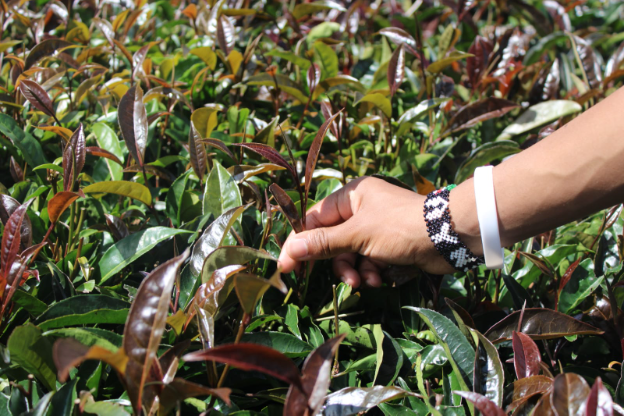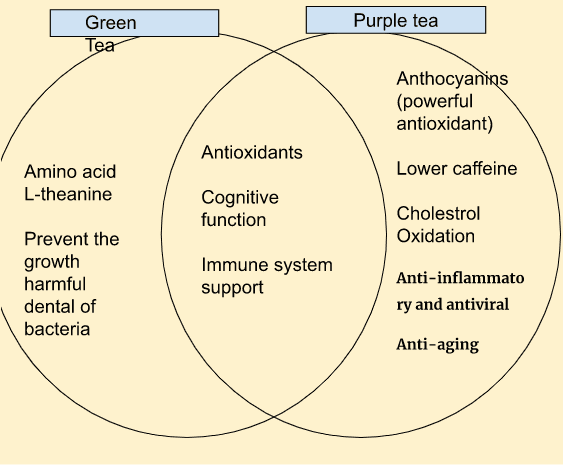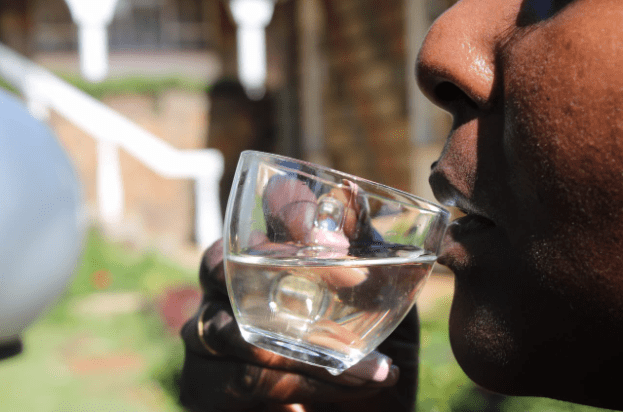Purple tea, Camellia sinensis var. Assamica, is a unique variety originating from the Camellia Sinensis plant, distinguishable by its distinct purple hue. This color is a result of a genetic mutation that triggers the production of anthocyanin, the same potent antioxidant found in blueberries.

Purple tea was first planted at Gatura Greens, in 2008 after close to 20 years of research by the Tea Research Foundation of Kenya (TRFK) as a pilot project. In 2011, the Kenyan Tea Development Agency flagged public farmers to commercially cultivate the purple tea.
Where Is Purple Tea Grown?
Purple tea is primarily grown in the Kenya Tea Belts. The Kenyan tea belts are high-altitude zones within 1,500 meters and 2,700 meters above sea level, associated with reliable rainfall and 8/9 hours of sunshine throughout the year.
Where was the first Purple Tea Farm?
Gatura Greens, on the slopes of the Aberdare Ranges, is the first ever commercial purple tea farm in the world, established in 2008. It is from this farm that Purple Tea Propagation expanded from the seedlings and cuttings distributed from here.
What is the difference between Purple tea and Green Tea?

Purple tea is a special variety of tea derived from purple tea leaves. Purple tea differs from other forms of tea such as green and black due to a specific genetic mutation that creates anthocyanin, a potent antioxidant also found in other foods such as blueberries. In fact, purple tea contains 1.5% anthocyanin, while blueberries have only 0.1%.
Purple tea is also high in polyphenols, which are known for their excellent health characteristics, including cardiovascular, anti-diabetes, and anti-obesity advantages, as well as protection against a variety of ailments and disorders.

At the Farm Tour, you get to indulge in a tea tasting of over 10 different types of teas that we produce, helping you have a discerning palate for the delicate taste notes of the different variants of teas in our line.
What Does Purple Tea Taste Like?
Purple tea offers a delightful, floral, and woody flavor profile. Its astringency is considerably lower than that of green and black tea, providing a pleasant tea-drinking experience.

It’s not too strong – more like a soft whisper of flowers. And a slight tinge of flavor that leaves a sweet feeling in my mouth
Hendrik
A floral scent, but a little delicate on the tongue. Leaves my tongue a little dry, like red wine
Sophie
What are the health benefits of Purple Tea?
Purple tea offers a range of benefits, making it a valuable addition to your wellness routine, including:
- Rich in antioxidants: Purple tea is considered to have the highest level of antioxidants after white tea. It is rich in anthocyanins, which fight free radicals, reducing the risk of chronic illnesses like cancer, tumors, and heart problems.
- Low calories: Tea contains zero calories and that is why in most populations, including Asian countries, tea is believed to reduce the amount of belly fat also known as visceral fat. Purple tea as a low-calorie beverage can be consumed in place of high-calorie drinks for purposes of weight management.
- Anti-inflammatory and antiviral: Purple tea contains anti-inflammatory and antiviral properties, which makes it valuable in fighting against common health problems. These included colds, flu, and other respiratory concerns like asthma.
- Reduce LDL (low-density lipoprotein): If LDL also known as bad cholesterol is oxidized, it changes to plaque and blocks the arteries. Purple tea lowers LDL levels and prevents cholesterol from being oxidized thus boosting heart health. Taking purple tea which also contains a higher concentration of the antioxidant polyphenols, combats free radicals, prevents the blocking of arteries and hence reduces the risk of heart disease.
- Promotes heart health: Purple tea alongside other types of tea is helpful in maintaining cardiovascular health. Aside from reducing cholesterol levels, which is crucial for boosting heart health, purple tea contains polyphenols and anthocyanins which prevent endothelial dysfunction, inflammatory processes and the risk of heart diseases.
- Good for skin: Purple tea is a natural moisturizer that keeps the skin hydrated and supple, all while reducing oiliness and breakouts.
- Anti-aging benefits: Purple tea’s antioxidants fight with free radicals and toxins in your body that otherwise can damage collagen and elastin, resulting in acne scars and dead skin. The free radical scavengers help even out the skin tone and oxygenates the skin.
- Useful as a hair and scalp tonic: The Anthocyanin in the Purple tea plant increases blood circulation in the scalp, thereby strengthening and fortifying the hair follicles.
Does Purple Tea Have Caffeine?
Yes, purple tea has caffeine. However, purple tea forms caffeine much slower in comparison with teas from the green tea bush. Here is a graphic representation of caffeine levels in the common tea varieties in the market:

Does Purple Tea Help With Weight Loss?
Losing weight involves a combination of healthy eating, physical activity, and lifestyle adjustments. You can combine these healthy lifestyle options with regular intake of tea.
Purple tea contains catechins and epigallocatechin gallate (EGCG), which are powerful antioxidants that have been shown to stimulate the body’s metabolism. When your metabolism is boosted, your body is able to burn more calories and fat, which can aid in weight loss.
Additionally, a special polyphenol called GHG found in purple tea may contribute to decreasing fat tissue thickness while promoting lean body mass.
Polyphenols can inhibit the absorption of fat in the body, which means that drinking purple tea can help prevent the body from storing excess fat. This can lead to weight loss, as the body will be more likely to burn stored fat for energy instead of storing it.
Where Can I Find Purple Tea?
You can order orthodox purple tea directly through Gatura Greens or check out our retail line, Brew It. You can also find loose-leaf purple tea from the major retail outlets in Kenya.
Fun fact: Did you know that purple tea is a pH sensitive tea? The purple tea liquor at an average cup strength has a light mystical purple hue, but adding just a drop of lemon juice will give you the most vibrant purple colour!


